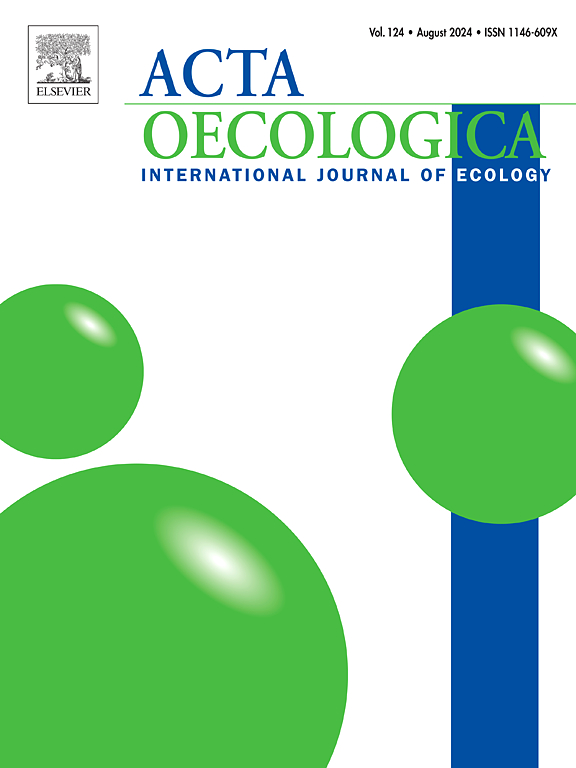Taxonomic identity, but not evolutionary relatedness, determines the carbon stock and uptake of tropical forests trees
IF 1.3
4区 环境科学与生态学
Q3 ECOLOGY
Acta Oecologica-International Journal of Ecology
Pub Date : 2025-02-17
DOI:10.1016/j.actao.2025.104065
引用次数: 0
Abstract
Carbon stock and uptake are among the main ecosystem services provided by tropical forests. Understanding the role of different drivers in current patterns of carbon stock and uptake is critical to predicting tropical forest responses to environmental changes. That said, taxonomic identity and evolutionary relatedness among taxa may synthesize intrinsic functional characteristics and provide insight into these patterns. Here we investigated the main ecological drivers (taxonomic vs. environmental effects) and the evolutionary legacy on the expression of two important variables: carbon stock and carbon uptake. The dataset used are composed by tropical forests sites located in the southeast of Brazil along a climatic gradient including evergreen forests, semideciduous forests and deciduous forests. Relying on forest inventory data from 30 tropical forest sites (33.86 ha), we calculated individual tree carbon stocks and obtained two variables at the population level (species per site): average carbon stock (ton/ha) and average carbon uptake (ton/ha/year). These variables were used joint to phylogenetic trees and analysis to evaluate the main factors explained the variables variation and the evolutionary fingerprint on them. Variations in carbon stock and uptake by individual trees were mostly determined by taxonomic identity (28.7% and 26.7%, respectively) rather than environmental factors (7.1% and 8.9%, respectively), but evolutionary relatedness did not predict similarity among species. Our results indicate that the ability of species to store and absorb carbon depend on their intrinsic characteristics, although these are not shared among closely related taxa. Climate projections predict the loss of species unable to adapt to novel conditions, which, in light of our results, could impact tropical carbon dynamics. Although evolutionary relatedness does not predict similarity in terms of function at the scale of our study (suggesting lability of traits related to carbon storage), species losses indicate that environmental changes are beyond species’ ability to adapt to changes.
热带森林树木的碳储量和吸收取决于分类学特征,而非进化相关性
碳储量和吸收是热带森林提供的主要生态系统服务之一。了解不同驱动因素在当前碳储量和吸收模式中的作用,对于预测热带森林对环境变化的反应至关重要。也就是说,类群之间的分类同一性和进化亲缘性可以综合内在的功能特征,并提供对这些模式的洞察。在此,我们研究了主要的生态驱动因素(分类学与环境效应)以及两个重要变量(碳储量和碳吸收)表达的进化遗产。所使用的数据集由位于巴西东南部的热带森林站点组成,沿气候梯度包括常绿森林、半落叶森林和落叶森林。基于30个热带森林样地(33.86 ha)的森林清查数据,计算了个体树木的碳储量,得到了种群水平(样地种数)的平均碳储量(t /ha)和平均碳吸收量(t /ha/年)。将这些变量与系统发生树和分析相结合,评价了解释变量变异的主要因素及其进化指纹。单株树木碳储量和碳吸收量的差异主要由分类同一性(分别为28.7%和26.7%)而不是环境因子(分别为7.1%和8.9%)决定,但进化亲缘性不能预测物种间的相似性。我们的研究结果表明,物种储存和吸收碳的能力取决于它们的内在特征,尽管这些特征在密切相关的分类群中并不共享。气候预测预测了无法适应新环境的物种的损失,根据我们的研究结果,这可能会影响热带碳动态。尽管在我们的研究范围内,进化相关性并不能预测功能上的相似性(表明与碳储存相关的性状不稳定),但物种的损失表明,环境变化超出了物种适应变化的能力。
本文章由计算机程序翻译,如有差异,请以英文原文为准。
求助全文
约1分钟内获得全文
求助全文
来源期刊
CiteScore
3.60
自引率
0.00%
发文量
57
审稿时长
>0 weeks
期刊介绍:
Acta Oecologica is venue for the publication of original research articles in ecology. We encourage studies in all areas of ecology, including ecosystem ecology, community ecology, population ecology, conservation ecology and evolutionary ecology. There is no bias with respect to taxon, biome or geographic area. Both theoretical and empirical papers are welcome, but combinations are particularly sought. Priority is given to papers based on explicitly stated hypotheses. Acta Oecologica also accepts review papers.

 求助内容:
求助内容: 应助结果提醒方式:
应助结果提醒方式:


